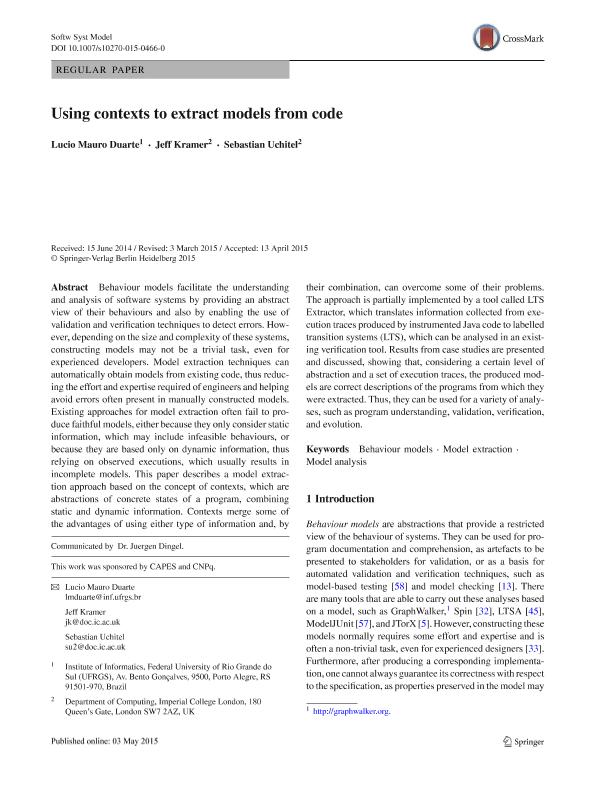Artículo
Using contexts to extract models from code
Fecha de publicación:
05/2017
Editorial:
Springer Heidelberg
Revista:
Software and Systems Modeling
ISSN:
1619-1366
Idioma:
Inglés
Tipo de recurso:
Artículo publicado
Clasificación temática:
Resumen
Behaviour models facilitate the understanding and analysis of software systems by providing an abstract view of their behaviours and also by enabling the use of validation and verification techniques to detect errors. However, depending on the size and complexity of these systems, constructing models may not be a trivial task, even for experienced developers. Model extraction techniques can automatically obtain models from existing code, thus reducing the effort and expertise required of engineers and helping avoid errors often present in manually constructed models. Existing approaches for model extraction often fail to produce faithful models, either because they only consider static information, which may include infeasible behaviours, or because they are based only on dynamic information, thus relying on observed executions, which usually results in incomplete models. This paper describes a model extraction approach based on the concept of contexts, which are abstractions of concrete states of a program, combining static and dynamic information. Contexts merge some of the advantages of using either type of information and, by their combination, can overcome some of their problems. The approach is partially implemented by a tool called LTS Extractor, which translates information collected from execution traces produced by instrumented Java code to labelled transition systems (LTS), which can be analysed in an existing verification tool. Results from case studies are presented and discussed, showing that, considering a certain level of abstraction and a set of execution traces, the produced models are correct descriptions of the programs from which they were extracted. Thus, they can be used for a variety of analyses, such as program understanding, validation, verification, and evolution.
Palabras clave:
Behaviour Models
,
Model Analysis
,
Model Extraction
Archivos asociados
Licencia
Identificadores
Colecciones
Articulos(OCA CIUDAD UNIVERSITARIA)
Articulos de OFICINA DE COORDINACION ADMINISTRATIVA CIUDAD UNIVERSITARIA
Articulos de OFICINA DE COORDINACION ADMINISTRATIVA CIUDAD UNIVERSITARIA
Citación
Duarte, Lucio Mauro; Kramer, Jeff; Uchitel, Sebastian; Using contexts to extract models from code; Springer Heidelberg; Software and Systems Modeling; 16; 2; 5-2017; 523-557
Compartir
Altmétricas




